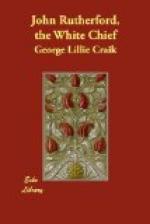At last they set out in company with Aimy and another chief, to pursue their way further into the interior; one of them, however, whose name is not given, remaining with Rangadi.
Having come to another village, the chief of which was called Plama,[AE] another of them, whose name was John Smith, was left with him.
The number of those preserved alive, it will be recollected, was six; so that, three of them having been disposed of in the manner that has been stated, there were now, including Rutherford, as many more remaining together.
When they had travelled about twelve miles further, they stopped at a third village, and there they remained two days.
“We were treated very kindly,” says Rutherford, “at this village by the natives. The chief, whose name was Ewanna,[AF] made us a present of a large pig, which we killed after our own country fashion, not a little to the surprise of the New Zealanders. I observed many of the children catch the flowing blood in their hands, and drink it with the greatest eagerness. Their own method of killing a pig is generally by drowning, in order that they may not lose the blood. The natives then singed off the hair for us, by holding the animal over a fire, and also gutted it, desiring nothing but the entrails for their trouble. We cooked it in our iron pot, which the slaves who followed us had brought along with the rest of the luggage belonging to our party.
“No person was allowed to take any part of the pig unless he received some from us; and not even then, if he did not belong to a chief’s family.
“On taking our departure from this village, we left with Ewanna one of our comrades named Jefferson, who, on parting from us, pressed my hand in his, and with tears in his eyes, exclaimed, ’God bless you both! we shall never see each other again.’
“We proceeded on our journey, in company with Aimy and his family, and another chief; and having walked about two miles without one word being spoken by any of the party, we arrived at the side of a river. Here we stopped, and lighted a fire; and the natives who had charge of the luggage having come up in about an hour, bringing with them some potatoes and dried fish, we cooked a dinner for ourselves in the usual manner. We then crossed the river, which was only about knee deep, and immediately entered a wood, through which we continued to make our way till sunset. On getting out of it we found ourselves in the midst of some cultivated ground, on which we saw growing potatoes, turnips, cabbage, tara[AG] (which is a root resembling a yam), water-melons, and coomeras,[AH] or sweet potatoes.
“After a little while we arrived at another river, on the opposite side of which stood the village in which Aimy resided. Having got into a canoe, we crossed over to the village, in front of which many women were standing, who, waving their mats, exclaimed, as they saw us approaching, ’Arami, arami,’[AI] which means, ‘Welcome home.’




